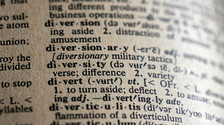azahrah.qolbaina
what the things that make verb 2 and verb 3 different
I was confised by verb 2 and verb 3. Can you explain it?
16 mrt. 2012 11:16
Antwoorden · 3
What is verb 1?
16 maart 2012
It sounds like you're asking about patterns like "see - saw - seen", or (Brad's example) "go - went - gone".
Basically, the past participle ("verb 3") always needs a helping verb. Always. It can't function without one. So you can say "I have seen" or "it is gone", but "it gone" and "I seen" are completely wrong; you need "it went" and "I saw" (simple past) in these cases.
You use the past participle in perfect tenses (I have seen; I had eaten; I will have spoken), hypothetical forms using "have" (I should have known; it could have sunk), or passive forms (it is known; that was eaten).
Verb 2 (past simple) is the basic past tense of the verb.
16 maart 2012
Are you talking about the simple past (e.g., "went") vs. the past participle (e.g., "gone")?
16 maart 2012
Heb je je antwoorden nog steeds niet gevonden?
Schrijf je vragen op en laat de moedertaalsprekers je helpen!
azahrah.qolbaina
Taalvaardigheden
Arabisch, Engels, Indonesisch, Turks
Taal die wordt geleerd
Arabisch, Engels, Turks
Artikelen die je misschien ook leuk vindt

Top 6 Mistakes to Avoid with Vocabulary Acquisition
38 likes · 10 Opmerkingen

Navigating Your First Job: Do's and Don'ts in the Workplace
47 likes · 21 Opmerkingen

What Content to Watch to Acquire Advanced-level Proficiency
79 likes · 50 Opmerkingen
Meer artikelen
